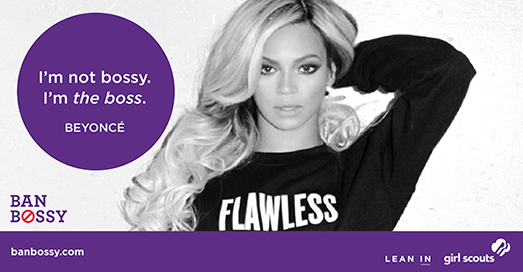Ban Bossy: Where Critics Miss the Point

Courtesy Ban Bossy Campaign
April 2, 2014

You may have seen a certain video going around your social media feeds this past week with Beyoncé’s determined gaze and a #BanBossy hashtag compelling you to click play. If you took the time to examine said post, you may have also found a ton of criticism in the comments section. Why, you may have wondered, are people criticizing Queen Bey’s latest feminist advocacy efforts? Well, the title gives it away: This is a campaign to (brace yourselves) ban a word—and that word is ‘bossy.’ And as may be expected, many jumped the gun at the first ‘B’ word.
I am talking about Sheryl Sandberg’s latest campaign to empower female leaders, this time focusing on the critical stage of girlhood. The Facebook CEO and author of bestseller “Lean In” partnered up with Girl Scouts to produce a campaign that aims to make girls less afraid of being perceived as assertive, a trait often replaced with more negative words like ‘bossy’—as well as other B words—as they grow older.
The campaign is based on the premise that nurture, not nature, is to blame for the lack of interest and aptitude in girls to be leaders. This claim is not unsubstantiated; according to Associate Professor of Political Science at Occidental College Caroline Heldman, at 7 years old, boys and girls want to be President in equal numbers, however, by age 15, girls become disproportionately less interested in leadership roles. Although by nature, girls are just as likely to be interested in leading, somewhere between ages 7 and 15, leadership roles and traits become less attractive to girls. Not surprisingly, research reveals that girls are twice as likely to worry that leadership roles will make them seem ‘bossy.’
There is certainly a cultural problem in how boys and girls are raised to think about leadership. Girls are discouraged from leading even through the language used when discussing female assertiveness and other traits associated with leadership. A male is a ‘boss’; a female is simply ‘bossy’. A common theme in the criticism of Ban Bossy is the so-called ‘restrictive’ approach of the campaign; many dislike the idea of banning words, even while acknowledging the damaging effect of negative words on children.
But the often-cited approach of reclaiming words and taking away their power is irrelevant to this campaign. At the heart of the “Ban Bossy” movement is a double standard in how male and female leaders are perceived: The main problem is not the use of a certain word, but the fact that there is an array of different terms reserved for female leaders, even though boys and girls that want to lead should be treated equally. A girl should not have to wonder why she’s being called different names than a boy for adopting the same behavior when she is not old enough to even understand what sexism is. In the critical stage of childhood, when personality and disposition are still developing, children should not have to be subject to criticism based on their gender. Criticizing girls before they are old enough to even fully grasp the reason they are being treated in such a way is robbing them of the opportunity to develop to their full potential. In doing so, we are also robbing our society of a large pool of talent.
Most people watching the video campaign will understand that it is not an attempt to literally enforce a ban on a word but a call to be conscious of the language we use around children when referring to girls. Language is incredibly impactful; it not only expresses our worldview but shapes it as well. Of course, “Kindly refrain from using words like ‘bossy’” is not nearly as catchy as “Ban Bossy.” If nothing else, this campaign made headlines and focused the public’s attention on an important issue, something many feminist initiatives have failed to do lately. This is a call to treat women as bosses rather than as people who are bossy so that we can rid ourselves of our own linguistic double standards that have unintended effects on girls. It is not the sole solution to the problem of underrepresentation of women in leadership roles, but it sure helps to understand and begin to fix the root of the problem.
Maybe the critics missed the punch line. It’s not about banning language, it’s about using the power of language to encourage rather than discourage, to promote equality rather than to exacerbate harmful gender distinctions. After all the statistics and not-so-fun facts, the core of the campaign was best captured by the closing line, as said by Beyoncé: “I’m not bossy, I am the boss.”









